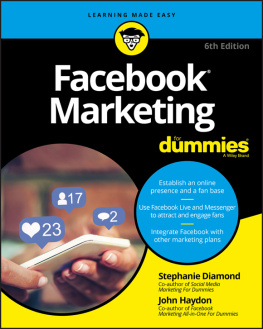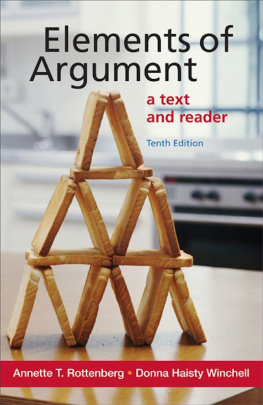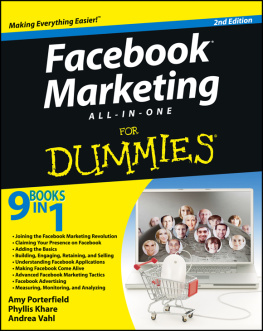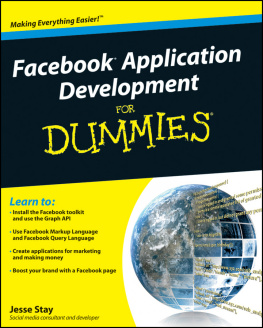Ronald Read - Delete Me: An Argument Against Facebook
Here you can read online Ronald Read - Delete Me: An Argument Against Facebook full text of the book (entire story) in english for free. Download pdf and epub, get meaning, cover and reviews about this ebook. year: 2013, genre: Computer. Description of the work, (preface) as well as reviews are available. Best literature library LitArk.com created for fans of good reading and offers a wide selection of genres:
Romance novel
Science fiction
Adventure
Detective
Science
History
Home and family
Prose
Art
Politics
Computer
Non-fiction
Religion
Business
Children
Humor
Choose a favorite category and find really read worthwhile books. Enjoy immersion in the world of imagination, feel the emotions of the characters or learn something new for yourself, make an fascinating discovery.

- Book:Delete Me: An Argument Against Facebook
- Author:
- Genre:
- Year:2013
- Rating:4 / 5
- Favourites:Add to favourites
- Your mark:
- 80
- 1
- 2
- 3
- 4
- 5
Delete Me: An Argument Against Facebook: summary, description and annotation
We offer to read an annotation, description, summary or preface (depends on what the author of the book "Delete Me: An Argument Against Facebook" wrote himself). If you haven't found the necessary information about the book — write in the comments, we will try to find it.
Delete Me: An Argument Against Facebook — read online for free the complete book (whole text) full work
Below is the text of the book, divided by pages. System saving the place of the last page read, allows you to conveniently read the book "Delete Me: An Argument Against Facebook" online for free, without having to search again every time where you left off. Put a bookmark, and you can go to the page where you finished reading at any time.
Font size:
Interval:
Bookmark:
Copyright 2013 Ronald Read.
All Rights Reserved.
Table of Contents
As of this writing, Facebook has approximately 1.1 billion monthly active users worldwide. This makes it not only the biggest social network on the internet, but the biggest ever. No social network, not MySpace , not RenRen, or even Google+ is or was larger than Facebook. And for all we know, no other social network will ever be larger than Facebook. Their membership along with their daily usage numbers have been going steadily upward since their founding in 2004. It would seem at this moment that Facebook could be the social network of the 21 st Century.
Facebooks success however is not the same as their concern for their users. The network routinely collects massive amounts of data on individuals to run their advertisement targeting business. This targeting works by using information to send advertisements to users based on their demographic and interests. In 2012 Facebook made over $4,279 billion dollars in revenue from advertising. When other fees that Facebook collects are added in, Facebook made $5.32 for every person on their network.
On the surface this deal might sound great. After all Facebook is providing their users free services in exchange for making them see a few ads on their Newsfeed. But despite how innocuous this deal might sound, there is a lot more to the situation than just free service for information. And the reason why is because there is a lot more that can be done with information than just sell advertisements.
Consider for instance that a Lexis Nexis study found that over 80% of police departments in America use Facebook to conduct law enforcement investigations. These investigations include both real world and online crimes that may have no direct relationship to Facebook whatsoever.
This example is just one of many that demonstrate the unintended consequences of using Facebook on a regular basis. A person logs in to Facebook expecting to a get a social experience. And they may very well get that experience by talking to friends and updating their profile. But at the same time they are seen as a product for advertisers and as an informant for police officers. This should make it clear that Facebook is not just a social networking site.
What is presented in the following chapters is an argument against Facebook. It details the numerous problems that stem from Facebooks excessive collection of information and why that system of collection will never change. Facebook wants to know everything about everyone in the world. Until users leave Facebook in massive numbers, Facebook will continue to progress towards achieving this goal.
The solution of leaving the network is a simple one to implement. First go to the Facebook log in screen. Then look in the bottom right hand corner and click the small lettering that says HELP. Click on the Manage Account option. It will include an option that says how to delete my account. After clicking on that screen it will then say to click on a link that will ask for log in information. There will also be a form that Facebook has departing users fill out. Facebook will then receive a request for a permanent deletion. The request will take 14 days to complete. Do not return to Facebook in the 14 day period, or else they will reinstate the account.
But many users have discovered that this process of deletion is not as easy it sounds. The real dilemma is in the decision to delete ones Facebook profile, not in the action itself. The measurement of reasons for why one should leave and why one should stay can be difficult. People may even suspect that there is something wrong with Facebook but they have no significant reason to leave so they dont. The objective of this book is to give every Facebook user a reason to leave. And if that is what you have come looking for here, rest assured that it is here where you will find it.
The question that we first have to ask ourselves is why do people use Facebook? Or better yet, what is it that makes this one social network so great compared to all of the others? After all Facebook is not radically different from a network like Google+ or Twitter. But for some reason Facebook has more members than they do. And the average Facebook user uses the network longer than the others do. There is something special about Facebook that we need to discover, if we havent already.
It is important that we understand why people love Facebook so much so we can understand why Facebook is something that should be abandoned. When people point out the flaws in Facebook, the counterargument always uses the positive aspects of Facebook to downplay the negatives. These positive aspects are real for the most part and are not hard to obtain for the average user. But when we are done looking at all that Facebook has to offer, we will see that the bad far outweighs the good. This imbalance is not readily apparent on the surface so we must take the time to examine both sides of the equation.
An Excellent Product
There are numerous ways for people to communicate over the internet, but Facebook is a cut above the rest. This quality is best represented by the fact that people are always using Facebook. Users will typically stay logged into the site for a half an hour at a time and they will log into the site multiple times throughout the day. Not every Facebook user is this loyal, but enough are so that there is always someone to talk to when you log into Facebook.
And what allows those people to visit the network so often is that it is compatible with a wide array of devices. Facebook is available not just on desktops, but also on a variety of smart phones , tablets, and gaming platforms. This compatibility of Facebook with other platforms makes the network easy to access regardless of what machine the user has. As a result people use Facebook whether they are at home, at school, at work, or anywhere else that has a good internet connection.
The ways that people can communicate with each other on Facebook are not one dimensional either There are plenty of different avenues to exchange information on the network other than just simple messaging. While logged into Facebook a user can comment on someones wall, make a post to the Newsfeed, chat in a private session, like another users content, and make use of numerous other features that Facebook gives to its users. This range of ways to communicate expands the type of conversations that can occur on Facebook while keeping the site from getting stale over time. It also shows Facebooks commitment to innovation despite being on top of the market.
And if there happens to be a feature that a user wants that is not present on Facebook, there are always applications that they can download. Applications are essentially programs that provide the user with a unique feature that they may or may not already have access to on the platform they are using. Facebooks Platform allows users to download millions of applications from developers from all over the world. These applications give users more out of the Facebook experience than what Facebook is able to give them. At the same time, the platform also allows application developers to test out their projects on one the most popular social networks on the internet. Everyone, in a sense, gets something out of the deal.
Along with giving users access to an excellent product, Facebook also gives access to it 24/7. Facebook is always available barring any serious mishaps or updates. This constant availability requires a dedication to engineering that other social networks in the past have struggled to accomplish. By going the extra mile however, Facebook gives their users an experience that they can tap into whenever they want. And that means they are going to use it more often than the other sites that go down every time the wind shifts.
Font size:
Interval:
Bookmark:
Similar books «Delete Me: An Argument Against Facebook»
Look at similar books to Delete Me: An Argument Against Facebook. We have selected literature similar in name and meaning in the hope of providing readers with more options to find new, interesting, not yet read works.
Discussion, reviews of the book Delete Me: An Argument Against Facebook and just readers' own opinions. Leave your comments, write what you think about the work, its meaning or the main characters. Specify what exactly you liked and what you didn't like, and why you think so.








